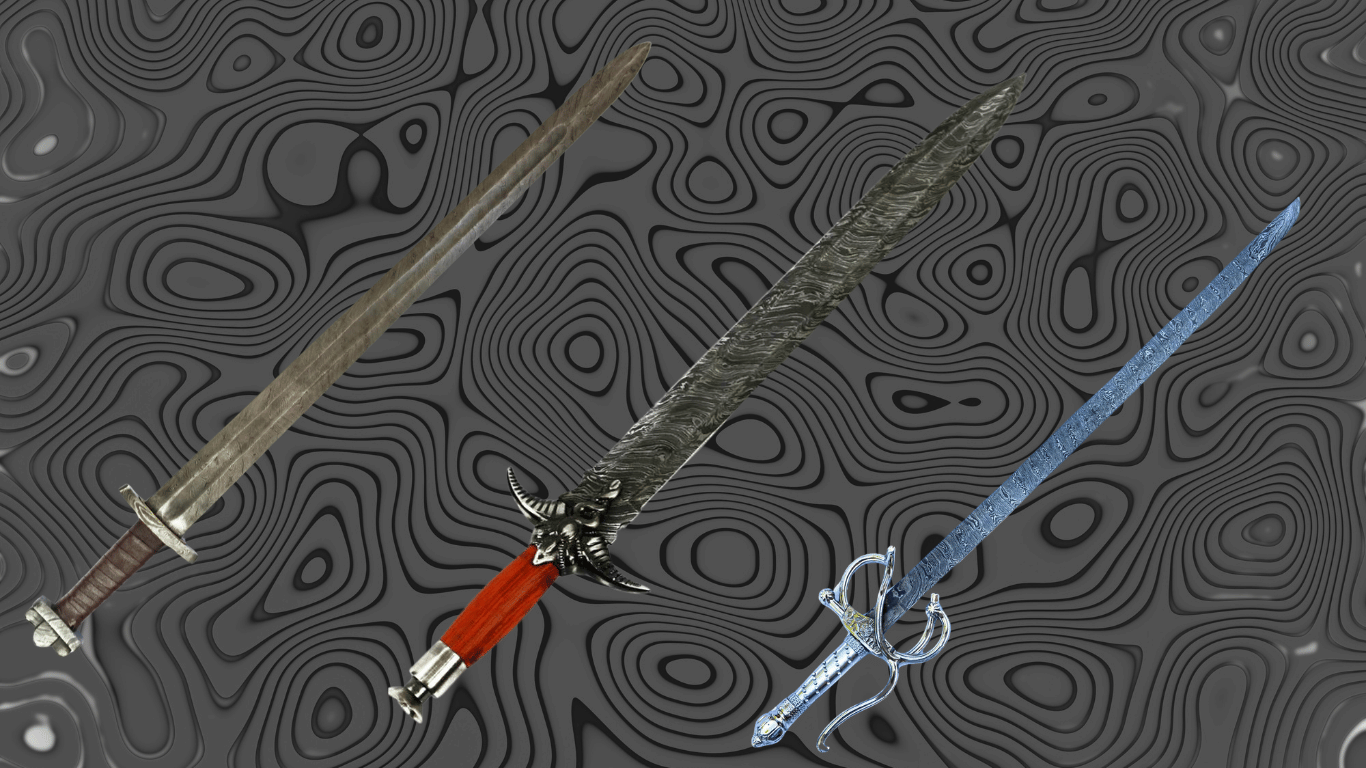Greetings to aficionados of swords! Have you ever pondered the factors that contribute to a sword’s strength and power? The answer lies in the material from which it is crafted. In this discourse, we will dissect sword materials in a comprehensible manner, aiding you in selecting the ideal one for your upcoming adventures.
Why Sword Materials Matter
Think of sword materials like ingredients in a recipe. Each one brings something special to the table, making your sword strong, sharp, or even fancy-looking. Let’s explore the top sword materials and what makes them unique.
1. High Carbon Steel: The Sturdy Warrior
High carbon steel is like the sturdy warrior of sword materials. It’s tough, holds a sharp edge, and can withstand tough battles. Picture it as the shield that keeps your sword strong and reliable. But watch out – high-carbon steel can rust if you don’t take care of it properly.
2. Stainless Steel: The Low-Maintenance Hero
Stainless steel is the hero that’s easy to take care of. It doesn’t rust much, so you can focus on your sword skills instead of worrying about maintenance. While it may not be as tough as high-carbon steel, it’s still a reliable choice for beginners or those who prefer low-maintenance gear.
3. Damascus Steel: The Artistic Marvel
Have you ever seen those swords with intricate patterns that look like works of art? That’s Damascus steel for you. It’s not just about strength – it’s about style! Damascus steel swords are made by folding and layering different types of steel, creating unique patterns that catch the eye. While they may not be as tough as other materials, they sure do stand out in a crowd.
4. Tungsten Carbide: The Unyielding Titan
Tungsten carbide is the titan among sword materials. It’s tough and durable, making it perfect for heavy-duty use. Think of it as the ultimate weapon for slaying dragons or battling evil wizards. However, its hardness comes at a cost – tungsten carbide swords can be brittle and challenging to sharpen.
Choosing the Right Sword Material for You
Now that you know about the different sword materials, how do you choose the right one for your needs? Here are a few things to consider:
- Intended Use: Are you a seasoned warrior looking for a battle-ready sword, or are you a beginner just starting your journey? Consider how you’ll be using your sword and choose a material that matches your needs.
- Maintenance: How much time and effort are you willing to put into caring for your sword? If you want something low-maintenance, stainless steel might be the way to go. But if you’re willing to put in the extra effort, high-carbon or Damascus steel could be a great choice.
- Style Preference: Do you want a sword that performs well and looks impressive? If so, Damascus steel might be the perfect fit. Its unique patterns add a touch of elegance to any sword collection.
- Budget: Sword materials can vary in price, so consider your budget when deciding. While high-end materials like Damascus steel may be more expensive, there are plenty of affordable options available in stainless steel or high carbon steel.
Frequently Asked Questions about Sword Materials
Q1: What is the best material for a sword blade?
A1: The best material for a sword blade depends on your preferences and how you plan to use the sword. High carbon steel is often favored for its combination of hardness and toughness, but stainless steel, Damascus steel, and tungsten carbide each have their own strengths and unique characteristics.
Q2: How do I maintain a sword made of high-carbon steel?
A2: High-carbon steel requires regular maintenance to prevent rusting. Keep the blade clean and dry, and apply a thin layer of oil to protect it from moisture. Regularly inspect and clean your sword, especially if it’s not in use for an extended period.
Q3: Is stainless steel a good choice for a beginner’s sword?
A3: Yes, stainless steel can be a good choice for beginners. It’s low-maintenance, resistant to rust, and generally affordable. However, keep in mind that it might require more frequent sharpening compared to high-carbon steel.
Q4: Can Damascus steel blades be as durable as other materials?
A4: While Damascus steel blades are known for their artistic patterns, their durability depends on the specific alloys used. Some argue that they might not be as tough as high-carbon steel, so it’s essential to consider your intended use and maintenance routine.
Q5: Are swords made of tungsten carbide difficult to sharpen?
A5: Yes, swords made of tungsten carbide can be challenging to sharpen. The hardness that makes them durable also makes the sharpening process more intricate. It’s recommended to have the sharpening done by a professional if needed.
Q6: Which material is best for decorative swords or collectibles?
A6: Damascus steel is often chosen for decorative or collectible swords due to its unique and eye-catching patterns. It adds a touch of artistic flair to a collection. However, if authenticity is a priority, historical replicas made from high-carbon steel can also be popular among collectors.
Q7: Are there budget-friendly options for quality sword materials?
A7: Yes, there are budget-friendly options available. Stainless steel and some high-carbon steel blades can offer good performance at a more affordable price. Consider your budget and intended use when selecting a sword material.
In Conclusion
Choosing the right sword material is an important decision that can greatly impact your sword-fighting experience. Whether you prefer the rugged durability of high carbon steel, the low-maintenance ease of stainless steel, the artistic beauty of Damascus steel, or the unyielding strength of tungsten carbide, there’s a sword material out there for everyone.
So, take your time, weigh your options, and choose the sword material that best suits your needs and preferences. With the right material by your side, you’ll be ready to embark on epic adventures and conquer whatever challenges come your way!
